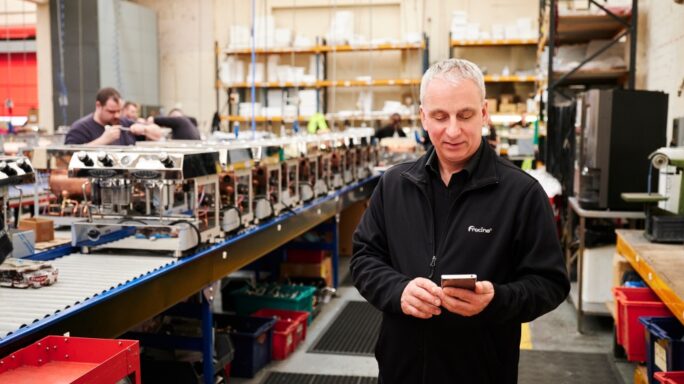How servitisation can help manufacturers win more business
Find out what servitisation means for your manufacturing firm, how data and Industry 4.0 can play a role, and discover tips to offer services to customers.

In days gone by, it was clear what your manufacturing business needed to do. You needed to make things. And that was it – you created tangible products that customers could see and touch, which they could hold as inventory.
With “servitisation”, today is very different. Read this article to find out what it means for your manufacturing firm, how data can play a role in offering customer service and tips to offer services to your customers.
What is servitisation?
If you want to grow your business and thrive in today’s challenging economy, you need to offer more than products to your customers in the form of added-value services – to servitise your offerings.
This means that as a manufacturer, you need to integrate your products with services, adapting your business models to offer additional value on top of what you make.
Factors such as commoditised products and shrinking margins mean you need to build in resilience if you are going to continue to thrive and make your business strong enough to deal with external uncertainties. You need to build in new value in what you offer and differentiate your business from the competition.
In research of 60 industrial engineering companies in Europe by PA Consulting, 75% expected that delivering services will become a significant part of their business in the next three to five years. They will be able to take advantage of higher margins and a closer relationship with customers.
Manufacturers are already offering services
Although you might not recognise servitisation as a term, it’s likely that you have already incorporated it in your business. Many manufacturers have already adapted and changed their business models by offering benefits such as repair guarantees, maintenance and help desks.
For example, ACO Manufacturing offers important services on top of its manufacturing of surface water management systems. The complexity of designing these systems means it offers customers added services such as whole system design, hydraulic calculations, AutoCAD detailing and parts schedules.
Technology is an enabler because it offers new ways to connect.
To take advantage, your manufacturing business must be data-driven to define and create new services, while working with your customers to understand their needs.
You must look at business management solutions that deliver a view of all actions that are happening within the organisation. With information across the entire lifecycle, from manufacture to delivery and aftercare, you’re armed with the data on your customers’ purchases, which allows you to identify where new service opportunities exist.
The value of the Internet of Things
Industry 4.0 and the Internet of Things (IoT) can play a key role when looking to provide proactive value-added services to customers. It’s an exciting opportunity for manufacturers to monitor the products they create directly without having to wait for them to go through an intermediate such as a consumer or distributor.
Interconnected smart devices can collect valuable data that you can use to offer services in addition to products, therefore delivering additional value to the customer. Fundamentally, IoT allows you to extend the base services that you already offer, increasing overall effectiveness and productivity.
IoT is already accessible to businesses and it’s a matter of when, not if, manufacturers should use it. It’s a way that your manufacturing business can move from simple product-based services to more advanced services that offer significantly more revenue potential.
You can start with more simple projects involving tracking or visibility, to more sophisticated advanced services requiring automation, artificial intelligence or predictive analytics. It also makes sense to start with simpler projects than ones that need more resource and outcome optimisation.
Manufacturers that own their facilities may already be adopting IoT, and it makes sense for those with long product cycles to adopt it to change their products and services.
Winning in the age of Industry 4.0 webinar
Watch this webinar to learn how embracing Industry 4.0 technology can power growth and efficiency for your manufacturing firm for years to come.

Servitisation in discrete manufacturing
Discrete manufacturers are challenged with increasing customer expectations and more competition. To meet the needs of well-informed digital customers, better connect supply chains, assets and products leads to servitisation.
Leaders in this industry will be able to create significant business value through connecting products and people, increasing the efficiency and effectiveness of their operations.
For example, hi-tech, automotive or industrial equipment businesses can focus on improving customer experience, whereas before they may have concentrated on the production and engineering side.
A lot of innovation come from combining analytics with robotics, where deep customer insight and the ability to offer services at scale can change the game.
Another example where IoT could work well is in construction, where a business can offer a full maintenance and repair service, where they can carry out preventative maintenance on the machines they offer.
Using telemetric data from the machines, a manufacturer could proactively schedule a maintenance call to service the equipment and make sure it does not fail, reducing potential downtime for the customer and ensuring customer satisfaction.
Five tips for servitising manufacturers
Here are five ways for your manufacturing firm to find success with servitisation:
- Connect and engage with your customers. They are the group that will benefit most from value-added services, while providing the data that will assist with innovation.
- Prepare case studies of successful servitisation examples and explain to your customers the value they will get with them.
- Ensure new services do not compete or conflict with what you already offer.
- Make sure the service offers fit or differentiate the brand or image of your manufacturing firm.
- Hit momentum by tapping into current market trends and the changing needs of your customers.
Final thoughts on servitisation
With digital transformation and connected customers changing manufacturing, Industry 4.0 creates a new paradigm where the cloud, analytics, AI, robotics and IoT can support your business in being more productive and efficient in a multitude of new ways.
Cloud-based technology, business management systems and actionable data creates the platform for servitisation, turning your business from one that just builds products to one that offers customer-focused services with products.
Industry 4.0 will help you build better long-term relationships, get better visibility and open the door to new products and services to unlock more revenue streams. Servitisation could be the key to remaining competitive in an evolving marketplace.
Discrete manufacturing in a changing world
Discover how economic, environmental and regulatory changes are changing the face of manufacturing, and learn about strategies that can help your firm remain productive.







Ask the author a question or share your advice